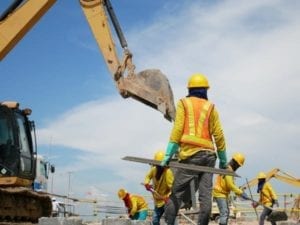While the South African GDP has seen some growth in the last four quarters, the construction industry remains key to expediting the recovery and creating jobs, according to CFO of privately-owned construction company, GVK-Siya Zama, John de Sousa.
De Sousa has been at GVK-Siya Zama for more than two decades, playing a pivotal role in the growth of the business and says that, over the past five years, the company has seen annual turnover grow 20% year on year, despite the global pandemic. This was achieved while many of GVK-Siya Zama’s competitors, including several listed companies, went out of business in some of the most treacherous conditions the economy has ever faced. De Sousa says the initial stages of the pandemic didn’t have the dire impact initially expected as projects were already on their books, but investor sentiment declined rapidly during the hard lockdown which led to a downturn in the company’s order book in the early part of 2021. “As investor confidence has since improved and the different stages of lockdown have eased, we’ve seen a glimmer of hope and recovery with more opportunities on the horizon.” The key to GVK-Siya Zama’s survival over this time has been its hands-on approach. “During the initial lockdown period, we spent our days in online team strategy sessions to mitigate risk, manage costs and keeping our teams involved, motivated and productive.”Investor sentiment has started to shift since Q3 this year and De Sousa says this augurs well for the industry and the country. “We are hoping to see the fruits of this in the next year as Covid gradually loses its grip on the country.”
Another catalyst to the recovery of the industry will be government infrastructure spend which is critical for job creation and economic recovery. “Government infrastructure spend and the rollout of projects and services to communities remain critical to the wellbeing of our country and its people. Government can jumpstart the economy and create numerous jobs through infrastructure spend. In turn, the construction industry plays a multifaceted role in economic growth through skills transfer, SMME growth and development, and creating local employment in communities where projects are taking place,” explains De Sousa. Today, De Sousa and his executive colleagues lead a modernised construction company with a young, hands-on management team. This approach, coupled with an ethos of integrity and hard work, has contributed to the business’s steady growth trajectory since 2015. The evolution of the company has seen this former painting and renovation contractor join the construction big league with big ticket projects of increased complexity requiring top notch skills and big match temperament. “In the last decade, we’ve grown to become a fully-fledged building contractor and count as one of the biggest privately owned national construction companies in the country. Our step up to the major league, combined with people-centric employment practices has positioned us as a preferred employer who attracts some of the best talent in the industry,” says De Sousa. In conclusion, he says the construction industry remains one of the most inefficient industries, and the company’s focus remains on reducing inefficiencies and subsequently, improving bottom-line.






